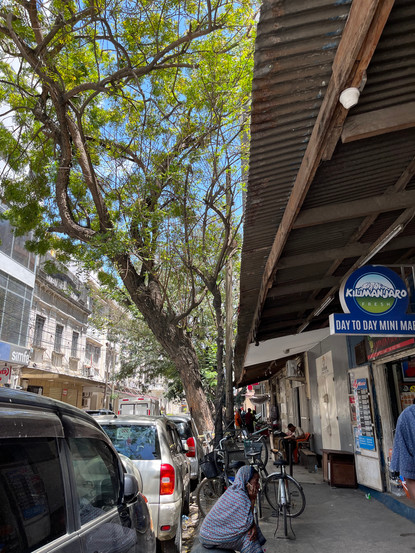Karibu Masaki!
- gcallah2
- Sep 20, 2022
- 2 min read
The journey from Barbados to Dar es Salaam, the capitol city of Tanzania took three planes and also my sanity (I was awake for 30 hours straight, abandoning attempts to sleep sitting upright in favor of airline coffee and black licorice - I don't recommend this). Dar is famous for its traffic jams, but as I arrived at night the way to the taxi ride to my hostel was unhindered. The huge yellow moon hung low and the air smelled like gasoline and sea salt. My taxi driver pointed out the Indian ocean where lines of cargo ships and oil tankers lit up the horizon, giving the impression of another city far out to sea.
For the past few days I have been staying in a hostel on the Masaki Peninsula, a wealthy neighborhood in Dar home to many ex-pats, foreign embassies, and fancy coffee shops. Dar es Salaam was founded in the 1860s by Sultan Majid bin Said of Zanzibar. It is now the biggest city in East Africa and one of the fastest-growing cities in the world, home to over 6 million people.

On my first full afternoon here, I took a tuk-tuk (three wheeled covered scooters, basically) to the Kariakoo Market in the center of the city. Markets and libraries are my two favorite places to visit in any new city, but this one was singularly chaotic and wonderful. I have no photos, as I was warned repeatedly that Kariakoo is a hotbed for pickpockets and cutpurses and I kept all of my valuables firmly in my running belt. Only this one, of the streets on the outskirts of the controlled chaos:

Just a few blocks ahead, the streets themselves disappear under umbrellas, tables laden with every imaginable product, vendors, milling shoppers, food carts selling beef mishkaki (kebabs), roasted corn, flatbreads, peanuts, cigarettes, and fruit. The blocks were grouped by theme: sandals, then bags and belts, kitchen supplies, and spices and produce arranged in sacks on the ground. When a burst of rain came, the vendors all produced tarps and covered their goods so fast that it looked like the fluid motion of some enormous multicolored plastic wing. For a minute the streets looked empty, everyone packed together under awnings and umbrellas. When the burst ended the market leapt back into action as if nothing happened, not a second of potential shopping time wasted.
Given the city's scale, I am leery of even claiming to have "seen" it as a short-term tourist. I spent many hours trying to get over jet lag and dehydration, finding ATMs and laundromats, procuring a local SIM card, and generally finding my footing before moving on to my next stop in Kagera. I did have the chance to meet with some folks in the Zanzibar seaweed farming industry, but my takeaways on this will have to wait. The industry's various actors do not always see eye-to-eye, and I will withhold judgement until I am actually in the islands and have a fuller picture of the situation. (Yes, this is clickbait! Stay tuned!)
Until next time,
Grace













Comments